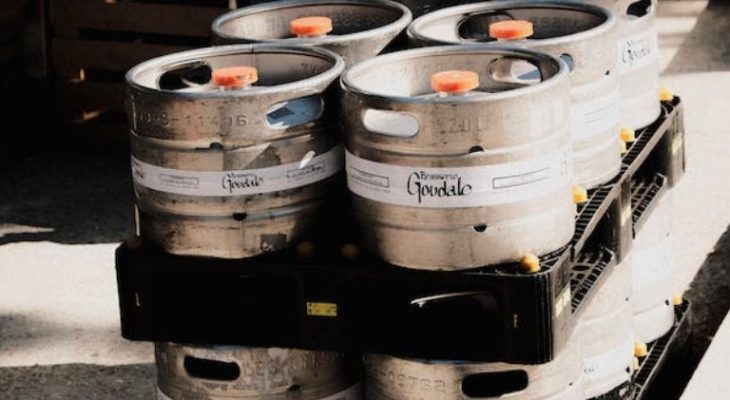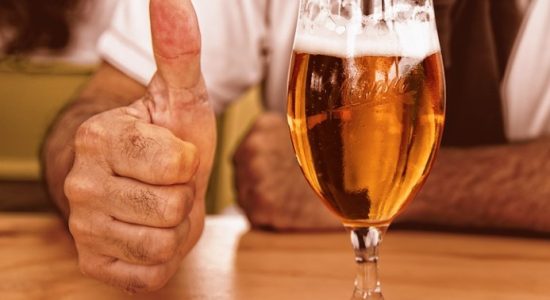How Long Does Natural Beer Carbonation Take in a Keg?

When I brew beer, sometimes I’m in a rush to serve it, and other times I want the natural fermentation process to occur to keep things as organic as possible. Excellent results can happen if you let a beer naturally carbonate. But how long does natural beer carbonation take in a keg?
Natural beer carbonation takes about two weeks in a keg. Carbonation can occur faster or slower, but generally, if beer is left in a keg to mature without any outside interference, it will take 14 days.
In this article, I’ll look at how long natural beer carbonation takes in a keg and why it takes this amount of time. I’ll also go over the various factors that impact natural beer carbonation.
Understanding Carbonation and Kegged Beer
Kegs are among the most popular ways to store and serve beer. You can find any of your favorite styles available on the draft worldwide. One of the reasons draft beer is popular is because you can get a perfectly carbonated beverage from the fridge to your glass.
Brewing beer isn’t complex, but it’s vital to follow some basic steps to get the proper carbonation and taste. Getting proper carbonation is essential not only for the taste of beer but also for the way that it looks.
Having the right amount of carbonation ensures that the beer has the right amount of foam or head.
Here’s an informative video on draft beer and what makes it popular:
Depending on the style I’m brewing, and when I need to serve it, I may consider carbonating my beer in a keg. But how long does this take?
The Average Time Natural Beer Carbonation Takes in a Keg
Beer is an inexact science that can lead to wildly varying results depending on numerous factors. However, it’s helpful to understand the general timelines when considering how long carbonation takes.
When I’m factoring in how long my beer will take to be ready to drink, I like to look at an average time, so what’s the average duration natural beer carbonation takes in a keg?
While subjective, the average amount of time is about two weeks for the beer to carbonate in a keg naturally.
The amount of carbonation desired may depend on the beer style and the brewer and consumer preferences, so this average is based on the amount of time it takes to produce generally acceptable carbonated beer.
Shortening the Length of Carbonation Time
There are a few ways people try to influence the carbonation rate when brewing beer. These will cut down the length of time but may also change the flavor or mouthfeel of the final product.
Here’s a list of things people do to shorten the length of carbonation time and whether I think it’s worth doing:
| Method | Does it Speed Up Carbonation? | Do I recommend It? |
| Cold Crashing | Slightly | It’s not necessarily worth it. |
| Adding extra yeast | Yes | Not always worth the risks. |
| Increase the temperature | Yes | Yes, if you control it properly. |
There are ways that you can increase the carbonation rate, but they will often have other effects on your beer. Some of these aren’t noticeable, while others are. One such example is if you use too much sugar, you may have a sweet beer.
Here’s a video I made describing what a sweet beer is:
Depending on what I’m trying to achieve and to whom I’m serving the beer, I may use some of these methods, but always be aware that they may have some side effects.
Factors That Influence Natural Beer Carbonation in a Keg
Brewing beer is full of unpredictability. One of these involves CO2 or carbonation. You can allow the carbonation from the results of yeast eating sugar naturally and have them stay confined in the keg.
This process takes a couple of weeks, but some factors influence how long natural beer carbonation takes in a keg. I’ll discuss some of these factors in the next section.
Organic Factors That Impact Natural Carbonation Time
There are plenty of naturally occurring variables that can influence the natural carbonation time for a beer. Some of these may slightly impact the amount of time before carbonation, while others may increase it dramatically.
Here are a few naturally occurring conditions that can affect the carbonation time for a beer:
- Extra oxygen got in the keg. The keg must be airtight for the yeast to turn the sugars into alcohol properly. If extra oxygen gets in the barrel, it can affect the time the natural carbonation takes place in the keg.
- Fluctuating temperature. If you’re brewing beer in an uncontrolled environment, the temperature could inadvertently speed up or slow down the carbonation process. One of the most important factors in the quality and speed of fermentation is temperature, as observed in this study.
- Unintended ingredients. Another natural occurrence that can impact the carbonation time in a keg is unwanted microbes. If you’re brewing beer and don’t clean your equipment, or you’re brewing using old-world techniques, there’s a chance you may encounter bacteria or natural yeast that can alter the carbonation time of your beer.
Manmade Changes That Impact Carbonation Time
You can control many factors of brewing beer, especially if you have the most advanced equipment. Managing outside influences can be vital in determining the length of time that beer carbonation takes.
Adding extra ingredients may impact the carbonation time, one of which is sugar. However, you can do other things to speed up carbonation time or slow it down. These include:
- Agitating the beer.
- Intentionally changing the temperature.
- Using specific varieties of yeast for optimal results.
These and other manufactured alterations can influence how long it takes for beer to carbonate.
Final Thoughts
One of my favorite things about brewing beer is watching the process. Seeing beer ferment without any outside influence can be a lot of fun. However, it can also be a bit unpredictable, and you won’t always have the same results, but it will lead to the most organic beer possible.
On average, if you leave your beer in a keg and there’s no outside interference, it’ll take about two weeks to carbonate. Some factors may change this, but as a general rule, it will take around 14 days for beer to carbonate in the keg naturally.



